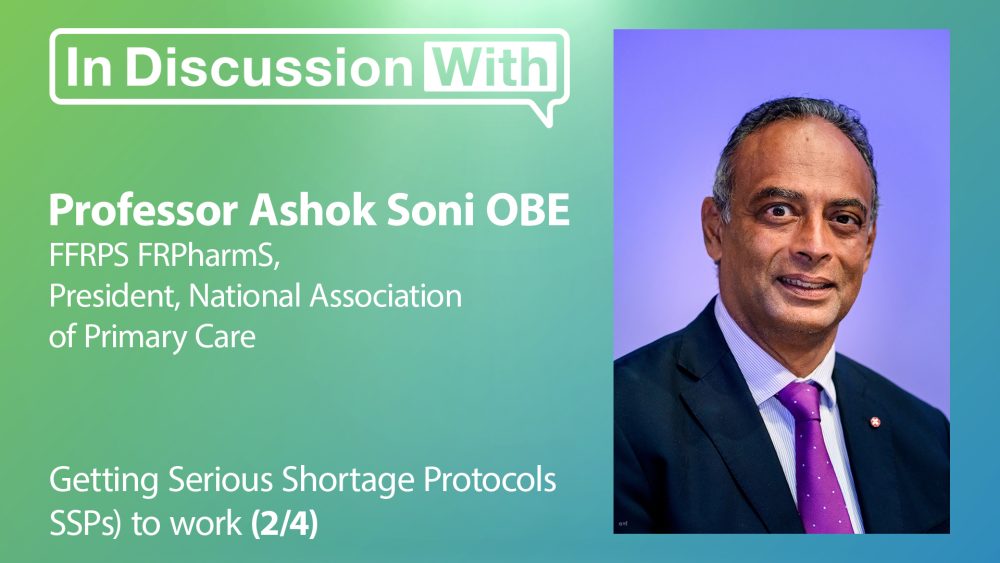Advertisment
Getting Serious Shortage Protocols (SSPs) to work

Despite the existence of Serious Shortage Protocols (SSPs) to ensure that alternative medicines are available when shortages occur, in practice numerous problems have arisen. Professor Ashok Soni OBE, community pharmacist and President, NAPC, explains why delays occur and how the situation could be improved.
Serious Shortage Protocols (SSPs) are only put in place after a shortage has been recognised and referred to the Secretary of State so “it’s not flexible or reactive as quickly as it could be …and we could do that more effectively”, says Professor Soni.
Currently a SSP in place for antibiotics for treatment of Strep A. Previously, there was a shortage of HRT and the system was slow to respond, creating difficulties for pharmacists, patients and doctors, he recalls. One of the problems with the current process is that if the SSP provides only one alternative product, there is a danger that a shortage of the alternative products also quickly develops. Community pharmacists are then obliged to send patients back to the GP for a different prescription, with all the consequent delays and frustration that that entails. Local protocols listing the appropriate alternative treatments that could be dispensed would be an efficient way to address this problem, he suggests. “The challenge again is, in a way, what you’re saying is the pharmacist takes responsibility for the decision- making, so it’s a bit of a stretch on the repeat prescribing. ….. to be able to say, ‘Well, I can’t get product X but product Y is equivalent and therefore I can use that to support ….. the care of the patient rather than having to bounce [them] backwards and forwards to be treated”, he adds.
The current SSP for phenoxymethyl penicillin (penicillin V) has been written to provide a list of alternatives to be supplied in descending order. However, in order for the pharmacist to be able to dispense an alternative antibiotic in accordance with the SSP, the prescriber has to write a prescription for the (unobtainable) phenoxymethyl penicillin. Professor Soni confirms, “you’re asking [them] to prescribe the wrong thing to get the right thing”. Worried patients might, in the meantime, contact their GPs to make sure that the alternative is satisfactory. If the GPs then decide to prescribe one of the alternative products to avoid such problems, there could be further difficulties because the SSP cannot then be used to supply an alternative in the event of a shortage.
Although the phenoxymethyl penicillin SSP makes sense from an administrative viewpoint it does not reflect what going on in practice. Professor Soni says, “There’s an element of this which is about lack of trust in us as pharmacists to make the right decisions and that’s part of the problem …….. Well, you’ve got to start to trust us. We’re clinicians, we care about patients. It’s not about the money, it’s about the quality of care that we provide; the money is a consequence and in a way it’s why I go back to [saying] help us to support the right decisions and it’s for other people to work out how the money flows”.
Patient-centred care
Patient choice is critical when designing new systems. “I think it’s really important that one of the things we bear in mind with all of this is about patient choice and what the patients and public would like to do”, says Professor Soni. Patients do not want to be travelling back and forth between health care professionals trying to find a solution, “they want the solution in one easy place so let’s find ways that the patient has that access at the point they want it, in the way they want it”, he says. This involves supporting all staff involved in patient care to deliver high-quality care. In addition, “We need to … make sure that we do genuinely build an integrated digital solution – and we have to see that as part of what we do. It doesn’t mean that I have to be able to write to the same records to as someone else – I may be able to write independently but it then populates the same record”, he explains. Innovative approaches to digital solutions could enable the use of up-to-date technology to build the best digital solutions that we can, he says.
About Ashok Soni OBE
Ashok Soni OBE is president of the National Association of Primary Care (NAPC) and is the first pharmacist to hold this position. As a community pharmacist and owner of three pharmacies, much of his time over the past two to three years has been devoted to vaccinations. Having “some incredibly talented staff” has enabled him to take on a number of other roles: He is a non-executive director at Oxford University Hospitals and a non-executive director at Sussex Integrated Care Systems (ICS), known as NHS Sussex, where he chairs the Workforce and Remuneration body.
Read and watch the full series on our website or on YouTube.
This episode of ‘In Discussion With’ is also on Spotify. Listen to the full podcast now.





